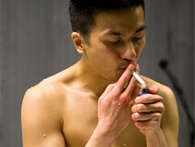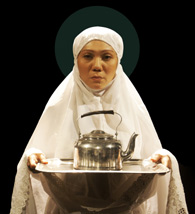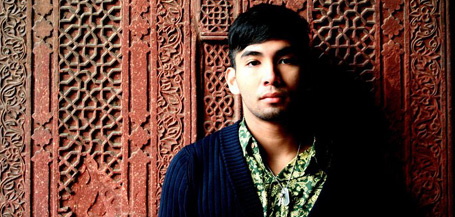The Fringe is back, organised once again by the extremely queer-friendly folks at The Necessary Stage. In previous years, they’ve explored themes like Art and Disability, Art and the Family, and Art and the Law; this time round, they’re venturing into potentially more explosive territory with the theme of Art and Faith.
“The Festival had initially chosen Art and Religion as the 2012 theme,” explains Haresh Sharma, who shares the role of artistic director with his colleague Alvin Tan. “However, in light of the applications received as well as in view of our desire to be as inclusive as we can in terms of the Festival’s offerings, we have broadened the theme.”
Thus, from 15 to 26 February, a total of 17 performances and art exhibitions will be held, exploring the boundaries of Buddhism, Christianity, Islam, plus various nationalisms and philosophies. There are works from Russia, Mexico, Myanmar, Italy, Iraq – plus quite a few from Singapore, of course. No preachy, sermonising works, of course – “The M1 Singapore Fringe Festival 2012 invites you to have faith, but more importantly, to interrogate faith,” Sharma declares.
As always, there are queer artists involved – at least three, by our count. Two of them are recognised Singaporean artists who’ve been featured in Fridae articles before. The third is a young (and rather handsome) director/playwright whose work interrogates his religion – an emerging theatremaker whom we’re delighted to profile here for the first time.
Bodies of resistance
Jason Wee’s been a fixture of the Singaporean visual art scene for some time. We’ve interviewed him before regarding his installation Bao Bei, composed entirely out of gay men’s faceless web profiles. What’s less well known about him is that he’s an extremely skilled writer. Since last June, he’s been working with director/playwright Sean Tobin on Tongues, a play to be staged from 16 to 18 February. It’s based on a series of surveys and interviews with Singaporeans about the conflicts they’ve experienced between religion and sex.
There’s a heap of stories in the play: a male prostitute’s appearance at a worship service; a homophobic principal’s virulent address to an assembly of butch schoolgirls. Strangely enough, the whole thing’s narrated by four dead bodies who wake up in the middle of a morgue. The creators assure us, however, that in spite of the somber setting, the play is actually very funny – and that it includes several opportunities for audience participation.

Following this run, a performance art event called Cane is scheduled on 19 February. Alas, it’s no use looking for tickets – the entire event was sold out within two days. This was due in no small part to the fact that the artist involved is Loo Zihan. He’s attracted quite a popular following after acting nude in Ekachai Uekrongtham’s movie Pleasure Factory. He’s also appeared in the films he’s directed himself, such as Solos and Threshold – both of which were so unapologetically gay that they were banned from theatrical screenings.
Cane is his re-enactment of the iconic 1993 performance art piece Brother Cane by Josef Ng, initially staged as a protest against the entrapment and caning of 12 gay men by the Singapore Police Force. It was a momentous event, not just for the queer community but also for the arts community: the controversy over the original work led to a ten-year ban on publicly funded performance art.
“My interest with Josef’s work lies in my ability to relate to the issues he was exploring in his work, and the confrontational approach he chose to adopt – a risky approach ahead of its time,” says Zihan. To those of us who hoped to see him live, he offers some consolation: he’ll be providing extensive documentation of the event online, for free.
Scripture revisited
Of all the shows in Fringe 2012, the performance I’m most personally excited to watch is Hantaran Buat Mangsa Lupa (Memories for the Victims of Amnesia), a triplebill of short plays by Irfan Kasban (top of page). It’ll be performed from 16 to 18 February in Malay, with English surtitles.

Irfan is still relatively unknown outside the Singaporean Malay theatre scene, which is a shame. He’s probably the only young playwright here who’s completely committed himself to the world of drama: he writes, directs, acts, designs lighting and publicity, and mentors playwrights younger than himself in the Youth Wing of the Malay theatre company Teater Ekamatra.
In the years since I started following his work, he’s distinguished himself by daring to write about Islam, even touching on it from a queer perspective. (He doesn’t do this out of anger or rebellion, either – in conversation, he gives me the impression that he just doesn’t regard these topics as taboo.) Hantaran is a presentation of his two earlier works based on religion, with the addition of a new work reflecting on the life of the Prophet Muhammad.
æ: Age, sex, occupation, location?
Irfan: 24, Male, Company Executive at Teater Ekamatra, Tampines, Singapore.
æ: How did you get involved in the arts?
Irfan: I started with Malay dance for graduation in K2, which continued to primary school. In Secondary School, I joined Dikir Barat [traditional Malay chorus] where I entered a few competitions. I later joined a Dikir Barat troupe and began writing for them even though I got a C6 for my Malay for O’levels. I won most promising lyrics in 2005 and then best lyrics in 2010. I started writing because I was frustrated with the quality of exploration in the works presented of the Malay literary Scene.
In 2006 began my first stint with theatre, where I participated in Teater Ekamatra’s White Box Festival as writer, director and performer. My team won the Challenge Trophy, Most Outstanding Script, Most Outstanding Production Design and Most Outstanding Use of Stimuli. Now, being very vain and bent on proving naysayers at that time, I joined Teater Ekamatra’s Playwright Mentorship Programme under the tutelage of Noor Effendy Ibrahim, where W.C. was conceived. From then on I was exposed to a series of productions, where I fell in love with the power of theatre. I am now in my site-specific and forum theatre phase.
æ: I'm intrigued by how you play with the tropes of Islam in your writing. Why have you kept returning to this subject?
In my youth I spent Sundays at a madrasah [While the Arabic term refers to any secular or religious educational institution, the madrasahs in Singapore claim to place rigorous emphasis on both secular and religious learning while maintaining a distinct religious identity.] and it was the stories of the prophets that resonated with me most. As Malay was the medium of instruction, this made me realise that there were many discourses that could be made between the language and the religion.
Again, I was frustrated by the lack of works addressing Islam that was supposed to be ‘a way of life’. For me presenting this trilogy is necessary, as if documenting a race that might not exist in a few decades due to our identity crisis, where we try to validate our relevance in society with each passing day.
æ: Tell us a bit about the plays in Hantaran Buat Mangsa Lupa (Offerings for the Victims of Amnesia).
Irfan: Genap 40, the first piece, is inspired by the birth of mankind, through Adam and Hawa (Eve). It talks about predestination, afterlife and the human condition. Genap 40 stars Mastura Ahmad playing a recently pregnant woman named Hawa, who requests for a meeting with the angel, Malaikat. The set is created as an art installation, and will performed in a ritualistic fashion, with Hawa preparing 40 glasses of tea.
W.C., inspired by the sacrifice of Ismail (Ishmael) in Ibrahim’s (Abraham) hands, explores comfort, sexuality and displacement. Two men are trapped in a toilet by circumstance, trying to negotiate a comfortable relationship in a very awkward space. Physicality is explored, with elements of Hajj pilgrimage, which frames the actions and gestures of the characters. Actors, Rian Asrudi and Sani Hussin, will literally be contained in a transparent toilet cubicle with very limited space to move. An intruder occasionally appears, shifting the balance of power and authority over the private space.
94:05, a monologue, invites the audience to the life and memories of Ahmad bin Abdullah, who struggles with his health, where death appears to more eminent with each passing day. He recites Surah 94 – Relief, focusing on 94:05 “So, verily, with every difficulty, there is relief”, and shares stories of the Prophet Muhammad from memory, to ease himself, and maybe even find a reason to want to continue live.
æ: Many gay Muslims feel that there's a conflict between their sexuality and their religion. What's your take on this?
Irfan: Conflict is evident in men of any religion. It is perhaps why religion came about. Life is but full conflict, which makes it only more interesting. But for me faith comes before religion, and faith preaches love. Being gay should not be the end of one’s life, or faith for that matter, for there are others with struggles that are equally daunting.
æ: Have people ever criticised your writing on religious grounds?
Irfan: Unfortunately, not yet. It is really strange when, most of the times, the response to my works is silence, which I hope is contemplative. My friends tell me that I may be treading on very dangerous waters, but are still very much supportive. I’d like to imagine my works hit a chord, which one never knew existed within them, or was maybe forgotten as a victim of amnesia.
æ: Who – or what – are your biggest inspirations?
Irfan: Water – it exists in many forms and structures, its movements only limited by its state.
æ: Is there anything else you would like to tell our readers?
Irfan: Thank you for taking time to read this.
Hantaran Buat Mangsa Lupa (Offerings for the Victims of Amnesia) will be staged at the Substation Theatre from 16-18 February at 8pm and on 18 February at 3pm. Tickets are $19. More information on the Singapore Fringe is available at http://www.singaporefringe.com, as well as at the mobile site m.singaporefringe.com. Tickets for all performances can be bought at Sistic.
Fridae has been a proud official supporter of the M1 Fringe Festival since 2007.












 打印版本
打印版本














